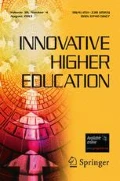As I write this brief column, the calendar turns to 2015. A glance over the shoulder can be both disappointing and gratifying. Nevertheless, the triumphs and missteps (or no steps) of 2014 are behind; and opportunities and challenges in the New Year await.
As educators, we can look into the rear-view mirror and see that many postsecondary problems remain as we enter a new calendar or school year; and significant issues are on the horizon. Based on our individual places in the great diversity of post-secondary institutions and programs, we could each make our own list of most pressing problems and potential solutions. Thus, I read with interest a few days ago a Forbes column by contributor John Ebersole (2015), President of Excelsior College, naming the top 15 higher education issues for 2015. Excelsior College, previously New York’s Regents College, is a virtual university, operating as a private nonprofit since 2001. The philosophy of the institution is “what you know is more important than where or how you learned it.” (See http://www.excelsior.edu/about). The website notes that Excelsior focuses on adult learners and is committed to workforce development and career advancement through online education, assessment of prior learning, and degree completion advising. Dr. Ebersole does indeed lead a 21st century institution.
In 2014, Dr. Ebersole’s take on the current status of higher education was that “white water” was ahead and that the currents of change would continue to be rocky. He was right. Commentators, supporters, and critics alike asked ongoing questions about the increasing costs of higher education and student debt, the value of a degree, workplace skills, and the relevance and quality of outcomes. Appearing on both the 2014 and 2015 lists of top issues were college costs, the Reauthorization of Higher Education Act, the skills gap and associated workforce development, assessment and outcomes, and competency-based education. New topics on the Ebersole list in 2015 included unionization, the President’s rating system, new business models, state protectionism, jobs for veterans, the completion agenda, and internationalization. In fact, Dr. Ebersole’s list identifies the dominant issues in the media and on many agendas of educational leaders and legislators. I would not take issue with the importance of each topic.
I am disappointed, however, in the distinct possibility of another year with more ill-defined problems, partial solutions, external playmakers, and a focus on the “business” of college. Of course, colleges should be concerned about demographics and international and national competitors, should be accountable in the use of resources, and should be concerned about the current and future world of work and student preparation. Some of the issues, however, only divert our attention away from the primary mission of all colleges and universities--the instructional mission. The primary work of colleges and universities is teaching and learning. To solve any dilemmas around competency, outcomes, skills, completion, and relevancy of degrees will take educational solutions, not business or structural solutions. We too easily become side-tracked into discussions of solutions that are far from dealing with teaching and learning. For example, are we going to fix the “skills gap” or “outcomes” or “college completion” with a new Presidential college rating system…really? A new rating or ranking system appears in my inbox every week. I am not aware that any have made a difference in the specific education of a single student. Why do we become involved in these side-track discussions? New business models? I am not sure what that means; but, if trends in higher education are any indication, that may just mean more contingent faculty members and attempts to “cost save.” Yes, cost-saving is important, but investing in and talking about the core mission--- teaching and learning --should be primary. Doing so just might save us money!
At the beginning of this New Year, I issue a call….a call for our focus to be first on teaching and learning. As educators, let’s be actively engaged in moving the local and national conversation to issues of teaching and learning. Let’s avoid the red herrings that divert our attention and drain our resources. Let’s call for direct investments in our primary educational missions. Thus, my question for the year will be “what does this topic or that issue have to do with teaching and learning?” If we stay focused, we may make significant progress in this New Year on those important topics of outcomes, completion and student learning overall.
References
Ebersole, J. (2014, January 13). Top Issues Facing Higher Education in 2014. Forbes. Retrieved from http://www.forbes.com/sites/johnebersole/2014/01/13/top-issues-facing-higher-education-in-2014/
Ebersole, J. (2015, January 6). Higher Education Issues: 15 for ’15. Forbes. Retrieved from http://www.forbes.com/sites/johnebersole/2015/01/06/higher-education-issues-15-for-15/
Author information
Authors and Affiliations
Corresponding author
Rights and permissions
About this article
Cite this article
Morris, L.V. Focus First on Teaching and Learning. Innov High Educ 40, 95–96 (2015). https://doi.org/10.1007/s10755-015-9317-8
Published:
Issue Date:
DOI: https://doi.org/10.1007/s10755-015-9317-8

